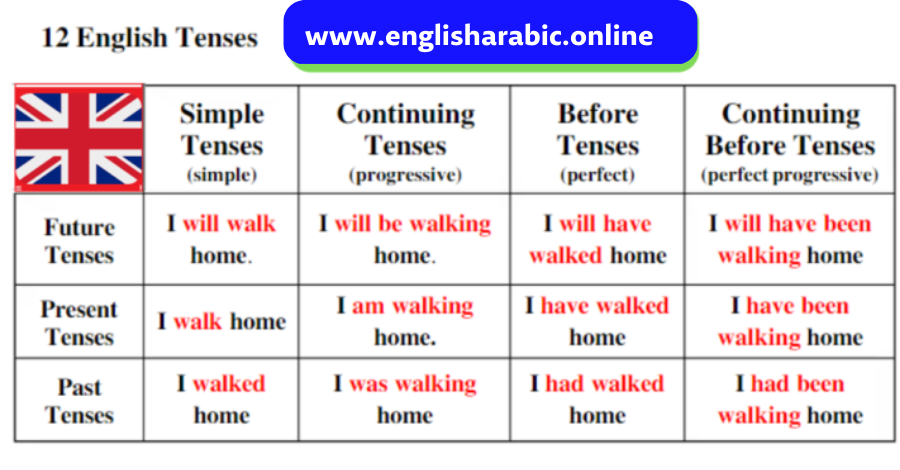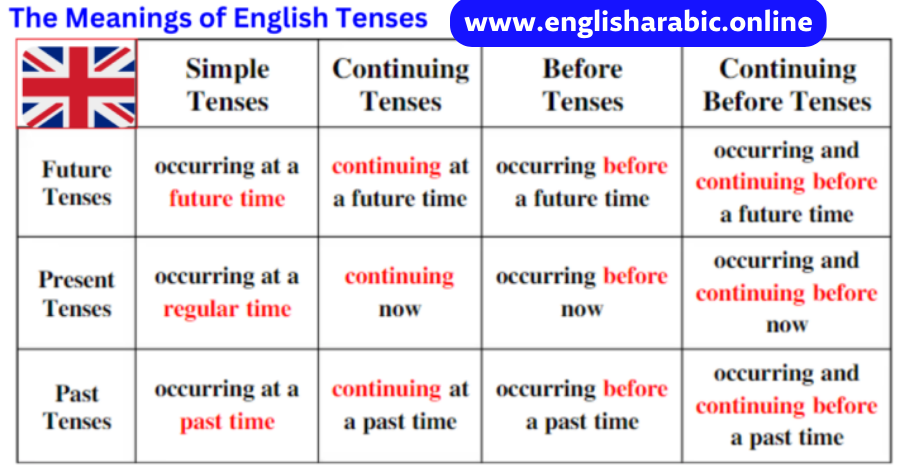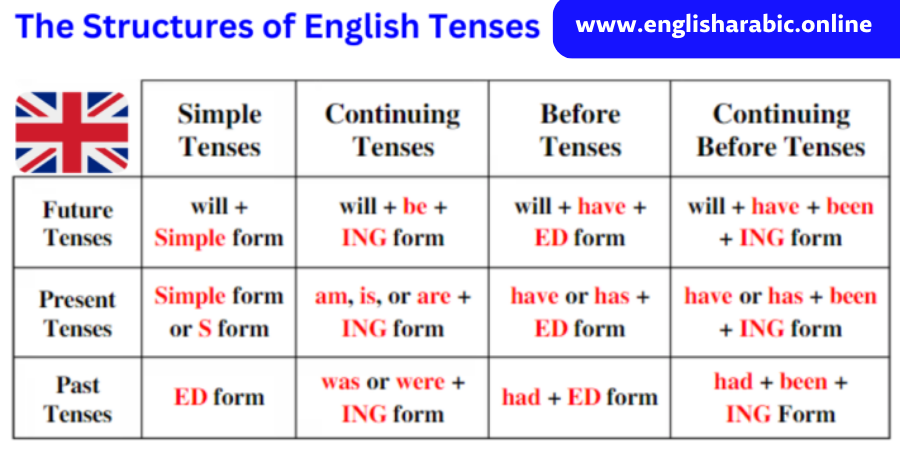Present simple tense
PRESENT SIMPLE TENSE QUIZ
The English Tense System
The links below are to lessons for each of the 12 basic tenses.
In each lesson we look at two aspects of the tense:
- Structure: How do we make the tense?
- Use: When and why do we use the tense?
Some lessons look at additional aspects, and most of them finish with a quiz to check your understanding.
Present Tense
Present Continuous Tense
Present Perfect Tense
Present Perfect Continuous Tense
Past Tense
Past Continuous Tense
Past Perfect Tense
Past Perfect Continuous Tense
Future Tense
Future Continuous Tense
Future Perfect Tense
Future Perfect Continuous Tense
Tenses
We use different tenses to describe the time that the verb refers to.



Present simple tense
25 Examples of Simple Present Tense Sentences
-
My father goes to gym every day.
-
She loves to play basketball.
-
She thinks he is very handsome.
-
I run every weekend.
-
We play tennis every morning.
-
Does he write an email?
-
They talk too much.
-
Does he go to school?
-
It usually rains every day here.
-
It smells very delicious in the kitchen.
-
My son lives in London.
-
My sisters do the ironing.
-
They make the bed.
-
My father always washes the cars.
-
My teacher sometimes forgets his keys.
-
I like ice-cream.
-
The students wear their uniform.
-
It smells very delicious in the kitchen.
-
Alex brushes her teeth twice a day.
-
He gets up early every day.
-
They speak English in USA.
-
We generally sing songs all together.
-
We go to a gallery every Sunday.
-
They drive their kids to school every day.
-
We walk slowly.
The simple present tense in English is used to describe actions that are repeated, habitual, true, or factual. Despite the name, you can also use simple present for things that are about to happen in the near future. We also use the simple present when describing states of being or feeling, even if they are temporary.
We form the simple present tense by using the base form of the verb, ie, the infinitive without the “to.” In the third person, we add “-s” or “-es” to the base form.
| Subject | Verb (base form or base form + “-s” or “-es” | Rest of Sentence |
| I/you/we/they | watch | the basketball game. |
| he/she/it/Matilda | watches | the basketball game. |
When to use the Simple Present Tense
Habits and Repeated Actions
If something happens repeatedly, including in the present, use the simple present tense.
- The train for Paris leaves at 5:50 am every day.
- I get up at 6:00 am on weekdays.
- Lucy is happier in the summer.
- They go to church every Sunday.
Facts and Generally True Statements
When something is always or generally true, use the simple present tense.
- Ice melts if you leave it on the table.
- John plays basketball well.
- My grandmother comes from England.
- Rabbits eat vegetables.
- The president of the United States lives in the White House.
The Near future
When something is almost certain to happen soon, you can also use the simple present tense:
- I go to college in the fall.
- My flight leaves at 7:00 pm tomorrow.
- When do you arrive?
- I start work next month.
Describing States
We generally use the present continuous (to be + verb-ing) to express things that are temporarily happening right now, but when we want to describe an internal or abstract state, we use simple present tense.
Stative Verbs
Existence: be, exist
Mental States: believe, doubt, think, know, realize, understand
Likes, Dislikes, Desires: like, hate, love, loathe, need, prefer, want
Possession: have, have got, own, belong
Sense: see, hear, touch, taste, smell, sense, feel
Appearance: look, seem, appear
- You look worried.
- The doctor believes in the power of science to heal.
- We need a better car if we want to take a road trip.
- I don’t understand computer languages.
You can find more information about stative verbs here.
Negative Statements
To make the negative with the simple present tense of “to be,” just add “not” after it:
- I am not happy about this.
- She is not going to the party.
- They are not here right now.
To make the negative with the simple present tense of other verbs, add “do not” (don’t) or (doesn’t) before the verb:
- They don’t look like they’re going to work.
- The rose bush doesn’t get enough sun.
Question Forms
Questions with “To Be”
To make a yes/no question with the simple present tense of “to be,” put the verb before the subject:
- Are you a doctor?
- Am I wrong about this?
- Is she hungry?
To make an open-ended question with the simple present tense of “to be,” put the verb before the subject, and a question word (who, what, where, when, why, how) before the verb:
- Who makes you breakfast?
- When is your flight?
- Where are you?
Questions with Other Verbs (not “To Be”)
Information Questions about the Subject
To make a question about the subject of a sentence, use a question word as the subject. The form is: question word + verb + rest of sentence:
- ??? people shop at this store. –>
- How many people shop at this store?
- ??? knows the answer. –>
- Who knows the answer?
- ???’s sister goes to school here. –>
- Whose sister goes to school here?
Questions about the Verb or Words after the Verb
To make a yes/no question about the verb or words after the verb, with the simple present tense of other verbs, put “do” or “does” before the subject and verb:
- Do you know the answer?
- Does she play basketball with you?
To make an open question about the verb or words after the verb with the simple present tense of other verbs, put a question word before “do” or “does” and the subject.
- You know the answer because ???.
- How do you know the answer?
- She plays basketball at ???.
- Where does she play basketball with you?
- You eat breakfast at ???.
- When do eat breakfast every day?
- You do ??? after school.
- What do you do after school?
Are you ready to see how well you know the Present simple tense ?
Try this fun QUIZ .
Present simple tense QUIZ
Exercise : Present Tense
Fill in the spaces with the correct form of the verb in simple present tense.
Example: I (play) play the guitar.
Example: Jessica (play) plays the guitar.
1) I (be) _______ sixteen years old.
2) Tommy (live) _______ at 107 Pine Lane.
3) Juana (cook) _______ dinner for her family.
4) They (eat) _______ lunch at 12:00.
5) Nina (take) _______ medicine when she is sick.
6) I (like) _______ chocolate.
7) He (drive) _______ a nice car.
8) We (want) _______ to see a movie tonight.
9) Mr. Anderson (teach) _______ chemistry at Hill High School.
10) They (study) _______ English at school.
11) I (want) _______ to go home now.
12) Bill and Calicia (drive) _______ to the mountains every year. every year.
13) We (eat) _______ pasta once a week.
14) It (snow) _______ here in December.
15) When Dax (take) _______ a shower, he (wash) _______ his hair with shampoo.
Simple Present (interrogative)
1. Write questions as in the example.
1. You / speak English. Do you speak English?
2. She / work hard.
3. They / have dinner at eight
4. Jill and Tom / study at university
5. You / do your homework every day
6. John / watch TV after dinner.
7. He / wash the car at the weekend.
8. Her friends / live in London.
9. You / have any brothers or sisters.
10. Your friends / go to the cinema very often.
2. Complete the questions with do or does.
1. ...... she take her dog for a walk in the morning?
2. ...... your friend Paul work in the shop over there?
3. ...... they know the answers to the exam?
4. ...... your parents know that you smoke?
5. ...... Bill teach maths?
6. Where ....... your sister live?
7. What time ...... the lessons finish?
8. ...... you go to the coast in summer?
9. ...... it rain very often in Ireland?
10. Why ...... they ask so many questions in class?
3. Write short answers to these questions (yes, I do / no, I don´t / yes, she does /
no, she doesn´t, ....)
1. Do you speak French? ................
2. Does your mother like chocolate? ............
3. Do you study a lot? ..............
4. Do you usually watch TV at night? ............
5. Do you play a musical instrument? ...........
6. Does your father work? .............
7. Do you go to the cinema? ............
8. Does your best friend study? .......
9. Does it rain a lot in Africa? ...........
10. Do you live in a flat? ...........
Answers :
Exercise 1:
2. Does she work hard?
3. Do they have dinner at eight?
4. Do Jill and Tom study at university?
5. Do you do your homework every day?
6. Does John watch TV after dinner?
7. Does he wash the car at the weekend?
8. Do her friends live in London?
9. Do you have any brothers or sisters?
10. Do your friends go to the cinema very often?
Exercise 2:
1. Does she take her gog for a walk in the morning?
2. Does your friend Paul work in the shop over there?
3. Do they know the answers to the exam?
4. Do your parents know that you smoke?
5. Does Bill teach maths?
6. Where does your sister live?
7. What time do the lessons finish?
8. Do you go to the coast in summer?
9. Does it rain very often in Ireland?
10. Why do they ask so many questions in class?
Exercise 3:
1. Yes, I do / No, I don´t 6. Yes, he does / No, he doesn´t
2. Yes, she does / no, she doesn´t 7. Yes, I do / No, I don´t
3. Yes, I do / No, I don´t 8. Yes, she/he does // No, she/he doesn´t
4. Yes, I do / No, I don´t 9. Yes, it does / No, it doesn´t.